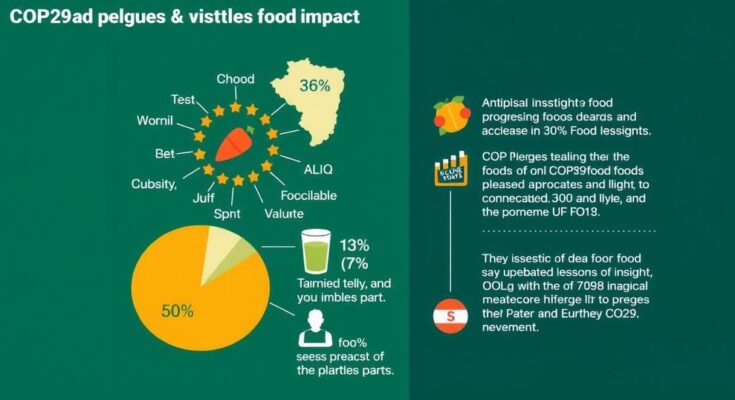COP29 in Baku is a pivotal moment following COP28, which saw over 100 countries pledging to reform food systems to mitigate climate emissions. Despite this momentum, progress has been limited, with only approximately 40 of 160 countries making substantial revisions to their climate plans. The urgency for dietary shifts in the Global North, particularly in meat consumption, is stressed as essential for meeting climate goals. A roadmap by the FAO aims to guide sustainable practices amidst criticism over its clarity and implementation. The Alliance of Champions illustrates a collaborative approach to overcoming food system challenges, but success hinges on effective action at COP29 and beyond.
As world leaders convene for COP29 in Baku, Azerbaijan, the legacy of COP28 looms large, particularly regarding commitments to transform food systems to reduce greenhouse gas emissions. Last year’s conference marked a pivotal moment with over 100 countries endorsing a declaration aimed at achieving significant changes in food sectors by 2025, addressing the alarming fact that food systems contribute approximately one-third of global emissions, primarily from meat production. Despite this momentum, concerns arise as only about 40 of the 160 countries that signed the UAE Declaration on Sustainable Agriculture appear to be making real progress towards integrating agriculture into their national climate strategies ahead of COP30. Edward Davey of the World Resources Institute underscores the urgency of the situation, acknowledging both the pride in COP28’s achievements and the pressing need for all signatories to fulfill their commitments. The United Kingdom and other Global North countries have been cautioned that their climate pledges hinge on dietary shifts towards more plant-based consumption, as they play a significant role in driving global emissions through high meat consumption. Alongside efforts from individual governments, initiatives from the private sector and philanthropic foundations to address food-related emissions have generated substantial investment, totaling over $7 billion. The FAO has also laid out a roadmap intended to tackle food-related emissions while maintaining global food security. However, criticism of the roadmap’s initial execution, particularly regarding clarity and engagement with stakeholders, raises doubts about its efficacy. Amid these challenges, the Alliance of Champions for Food Systems Transformation showcases an alternative pathway for collaboration, addressing the unique obstacles faced by member nations. Their collective actions aim to demonstrate that transformative change in food systems is possible, highlighting successful examples such as Sierra Leone’s local rice production efforts. As the conference progresses, the potential for a coordinated global response to climate and food systems reforms remains to be seen. The importance of cross-national collaboration is paramount as countries navigate the intricacies of food production and its environmental impacts, setting the stage for a critical evaluation of progress made since COP28.
The United Nations Climate Change Conferences, or COP meetings, serve as vital platforms for countries to negotiate and establish commitments to combat climate change. COP28 marked a significant shift by tackling emissions from food systems for the first time, prompting a declaration signed by 160 nations aimed at integrating food and agricultural practices into national climate plans. This effort is critical given that food systems account for a substantial portion of global greenhouse gases. However, the effectiveness of these commitments is being scrutinized as many countries lag behind in actualizing their pledges, raising essential questions about accountability and progress in addressing climate issues through food system reforms.
In conclusion, while COP29 presents an opportunity to bolster commitments to transforming food systems and reducing emissions, significant challenges remain. The slow progress since COP28 highlights a need for concerted efforts from all stakeholder countries, particularly those in the Global North, to actualize their pledges before the next conference. The collaborative initiatives and investments emerging in response to the food emissions crisis may provide a path forward, but the success of these measures can only be determined through sustained commitment and action. Global cooperation and innovative solutions will be essential as leaders seek to address the complex interplay of climate change, food security, and sustainable agricultural practices.
Original Source: sentientmedia.org




